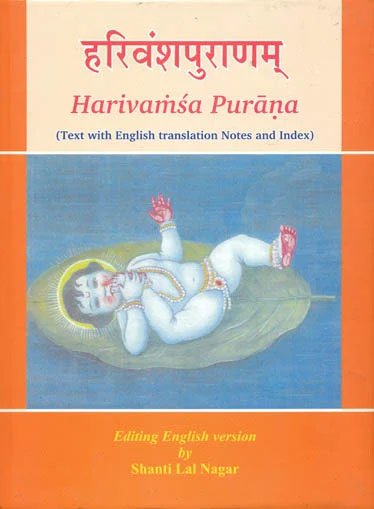Harivamsha Purana
by Manmatha Nath Dutt | 1897 | 293,872 words | ISBN-10: 8178542188 | ISBN-13: 9788178542188
This page is entitled “account of sagara (continued)” and represents Chapter 15 of the first book (‘Adi Parva’) of the Harivamsa (English translation in Prose). The Harivamsha Purana narrates the lineage and life-story of Krishna (Hari). Although not officially mentioned in the list of Puranas, this book includes topics such as geology, creation theory, time (manvantaras), ancient historical legends and accounts of royal dynasties.
Chapter 15 - An Account of Sagara (continued)
1. Janamejaya said:—By what observance, O twice-born one, did the sixty thousand heroic and powerful sons of Sagara attain to greatness?
2. Vaishampayana said:—Sagara had two wives whose sons had been consumed by ascetic observances. The oldest of them, the daughter of the king of Vidarbha, was celebrated by the name Keshini.
3. His youngest wife was the pious daughter of Arishthanemi, who was unequalled on earth in beauty.
4-5. Hear, O king, what boons Aurva conferred upon them. He wanted one of them to take sixty thousand sons and the other to pray for one son (only) after her heart who will perpetuate the race. Of them she, who was avaricious, prayed for many mighty sons.
6. The other prayed for only one son, who will keep up the prestige of the family. The ascetic conferred on her the same boon. Sagara begat on Keshini a son named Asmanja.
7. That highly powerful king also passed by the name of Pancajana. The other, as the rumour is, gave birth to a long gourd consisting of seeds.
8. Therein lay like corns sixty thousand embryos. They grew up duly in proper time.
9. The father threw those embryos into vessels full of clarified butter and appointed equal number of nurses to look after them.
10. When ten months were complete thence came out with ease and in proper time those sons of Sagara enhancing his delight.
11. In this way, O king, there originated from bottle gourd the sixty thousand sons of Sagara.
12. When they were consumed by Narayana’s energy one of them only survived namely, Pancajana who became the king.
13. Pancajana’s son was the energetic Angsuman. His son Dilipa also passed by the name of Khattanga.
14. Coming down to this earth from heaven and taking birth there he, within a moment, ransacked the three worlds by virtue of his intelligence and truthfulness, O sinless one.
15. Dilipa’s son was the great king Bhagiratha who, powerful as he was, brought down the best of rivers Ganga.
16. That noble and illustrious king, equal to Sakra in prowess, brought her to the ocean and then considered her as his daughter. Therefore by the Rishis who keep account of families she has been styled Bhagirathi.
17. Bhagiratha’s son was the celebrated king Shruta. The highly pious Nabhaga was Shruta’s son
18. Nabhaga’s son was Ambarisha who was the father of Sindhudvipa, whose son was the powerful Ayutajit.
19. The illustrious Rituparna was Ayutajit’s son. He was powerful, well-versed in the game of celestial dice and a friend of king Nala.
20. The king Artaparni was Rituparna’s son, whose son was the king Sudasa who became the friend of Indra.
21. The king Soudasa was Sudasa’s son. He was celebrated by the name of Kalmashapada and was greatly attached to his friends.
22. Kalmashapada’s son was known by the name of Sarvakarma whose son was the celebrated Anaranya.
23. Anaranya’s son was Nighna who had two sons, both leading kings, by name Anamitra and Raghu.
24. Anamitra’s son was the educated and pious Duliduho. His son was Dilipa, the grandfather of Rama.
24. Dilipa’s son was the large-armed Raghu. The highly powerful king Raghu reigned in Ayodhya.
26. Aja was born of Raghu and Aja’s son was Dasharatha whose son was the virtuous-souled and illustrious Rama.
27. Rama’s son passed by the name of Kusha whose son was Atithi and whose son was Nishadha.
28. Nishadhas son was Nala whose son was Nabha. Nabha’s son was Pundarika whose son passed by the name of Kshemadhanva.
29. Kshemadhanva’s son was the powerful Devanika whose son was the great Ahinagu.
30. Ahinagu’s good son was the king Sudhanva, as whose son was born the king Anala.
31. Anala’s son was the virtuous Uktha, the son of which high souled (king) was Vajranabha.
32. His son Shankha was celebrated for his great learning and passed by the name of Dhyushitashva. His son was the learned Pushpa, whose son was Arthasiddhi.
33. His son was Sudarshana, whose son was Shighra and whose son was Maru.
34. Maru practised Yoga in the island of Kala. His son was the illustrious king Vrihadvala.
35. O foremost of Bharatas, in Purana, there are two kings celebrated by the name of Nala. Of them one was the son of Veerasena and the other was a descendant of Ikshvaku.
36. I have thus described (to you) in order of precedence the leading members of the Ikshvaku race. These kings, of immeasurable energy, belonged to the solar dynasty.
37-38. By reading the account of creation by the illustrious Sradhadeva Aditya who confers nourishment upon creatures a man gets offspring, attains to the same status with the sun, is freed from sins and haughtiness and obtains longevity.
